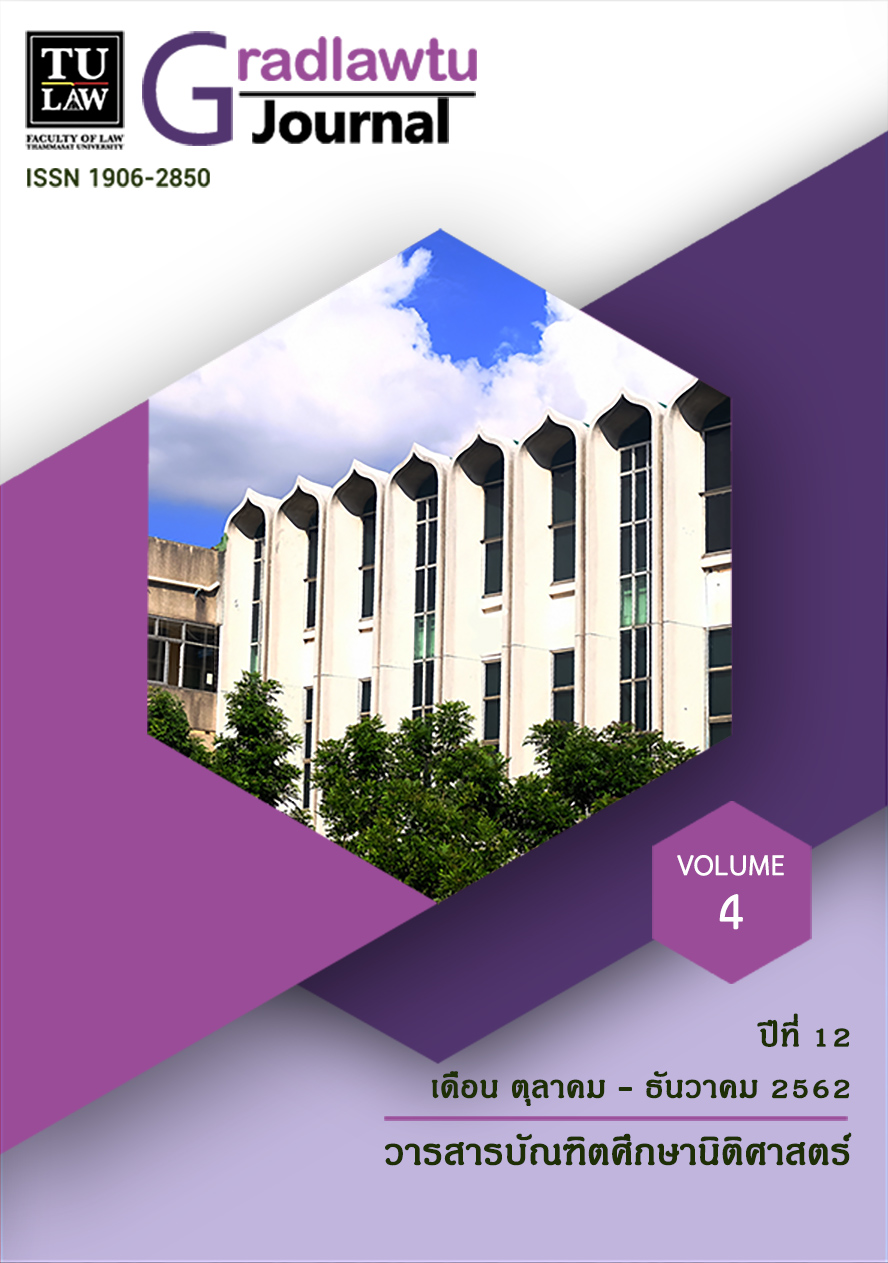THIRD PARTY PROTECTION MEASURES FOR JURISTIC ACTORS IN GOOD FAITH WHO PAY CONSIDERATIONS AFTER COURT RECEIVERSHIP ORDERS AGAINST DEBTORS BEFORE PUBLICATION IN THE GOVERNMENT GAZETTE
Keywords:
Receivership order, Government Gazette, Good Faith principleAbstract
Bankruptcy procedure rules deal with accumulating, and disposing of, bankruptcy debtor estates, while apportioning payment to creditors fairly and equally in a ratio obligation (paripassu) that solves general civil cases on a first come, first served basis. Unfairnesses for creditors have arisen. Therefore, the way to make the debtor's property not diminish further is to limit the power of receivables in property management by giving the said power to a middleman to proceed so that creditors will receive payment without causing disadvantage. Otherwise, the debtor may proceed with management or manipulation of property to prevent all creditors from receiving payment fairly and equitably in proportion to the debt, therefore bankruptcy law has limited the power to manage debtor property while the debtor has been ordered by the court to comply with Section 24 of the Bankruptcy Act B.E. 2483 (1940, The Act) until the debtor ceases bankruptcyby debt consolidation, bankruptcy cancellation, or release from bankruptcy, as the case may be, by giving the power to the official receiver to proceed while the debtor is restricted.
As provided for in Section 22 of The Act, in which the debtor is restricted to the power to manage assets beginning in effect from the date the court issues the receivership order under Section 62 of The Act, if the debtor violates any action relating to the property in a manner that causes the property to decline as such, the Court would interpret it as null and void under Section 24 of The Act, as well as Section 150 of the Thailand Civil and Commercial Code, even if an outsider has done that to the debtor in good faith.
This thesis considers the problem of how third parties are covered through provisions of Section 28 of The Act stipulating a receivership order, which has the effect of limiting management power of the property and must be published in the Government Gazette and advertised in at least one newspaper or electronic medium. That is to say, on the website of the Legal Execution Department (www.led.go.th) as specified in Section 148/1 of The Act, both of which have the purpose to inform the status and ability of debtors in relation to the business and the debtor’s assets. While the court has an order to safeguard the property, the debtor is unable to manage his property or business in order to allow the public to be cautious in doing legal, or any other, actions with the debtor. This issue leads to studying ways to find measures that protect third parties who entered into juristic acts with debtors in good faith and paid compensation after the court ordered receivership, but prior to announcement of the receivership order in the Government Gazette.An international comparative legal study was made of bankruptcy law in the United States, the United Kingdom, Japan, and the Netherlands as well as the United Nations Commission On International Trade Law (UNCITRAL) Legislative Guide on Insolvency Law. Which bankruptcy laws of these countries have measures to protect outsiders who act in good faith and pay compensation after the court has ordered the receivership but before the receivership order was announced in the Government Gazette was noted. In addition, UNCITRAL bankruptcy drafting guidelines explained and suggested such cases. These findings suggest that the bankruptcy law of Thailand should be amended from current legislation in The Act to create measures to protect a third party or third parties who enter into legal acts with debtors after the court's trusteeship order but before the announcement is made in full as provided by law, to protect third parties from damage as well as ensure compliance with UNCTRAL bankruptcy law guidelines, including in civil society. In addition, guidelines for the announcement of the receivership order that are most effective and effective should be developed which are suitable for today's evolving society.
References
2. จักรปาณีศรีศิลวิสุทธิ์, หลวง.กฎหมายลักษณะล้มละลาย. กรุงเทพมหานคร : มหาวิทยาลัยธรรมศาสตร์และการเมือง, 2478.
3. ประสิทธิ์โฆวิไลกุล.คำอธิบายประมวลกฎหมายแพ่งและพาณิชย์ ลักษณะจัดการงานนอกสั่งลาภมิควรได้. พิมพ์ครั้งที่ 3. กรุงเทพมหานคร : นิติธรรม, 2557.
4. ปรีชา พานิชวงศ์. คำอธิบายกฎหมายล้มละลาย. กรุงเทพมหานคร : นิติบรรณาการ, 2548.
5. ศนันท์กรณ์ โสตถิพันธุ์, คำอธิบายนิติกรรม สัญญา.พิมพ์ครั้งที่ 21. กรุงเทพมหานคร : สำนักพิมพ์วิญญูชน, 2560.
6. สุธีร์ศุภนิตย์. หลักกฎหมายล้มละลายและฟื้นฟูกิจการ. พิมพ์ครั้งที่ 9. กรุงเทพมหานคร : วิญญูชน, 2556.
7. วรรณชัย บุญบำรุง. “หลักทั่วไปของการดำเนินกระบวนพิจารณาคดีแพ่งของฝรั่งเศส.” วารสารนิติศาสตร์, ฉบับที่ 1 ปีที่ 30, (มีนาคม 2543): 78-112.
8. Henry Campbell Black.BLACK'S LAW DICTIONARY. 4th edition. -: WEST PUBLISHING CO., 1968.
9. UNCITRAL.UNCITRAL Legislative Guide on Insolvency Law. New York : United Nations, 2013.
10. Ministry of Justice, Japan. “Bankruptcy Act.” Japanese Law Translation Database System. Accessed April 5, 2018. http://www.japaneselawtranslation.go.jp/law/list/.
11. The national archives. “Insolvency Act 1986.” Accessed June 5, 2019. https://www.legislation.gov.uk/ukpga/1986/45/section/240.
12. Dutch Civil Law (DCL). “Bankruptcy Act.” Accessed July 5, 2018. http://www.dutchcivillaw.com/bankruptcyact.htm
Downloads
Published
Issue
Section
License
บทความหรือข้อความคิดเห็นใด ๆ ที่ปรากฏในวารสารบัณฑิตศึกษานิติศาสตร์เป็นความรับผิดชอบของผู้เขียนบทความโดยเฉพาะ คณะนิติศาสตร์ มหาวิทยาลัยธรรมศาสตร์ และกองบรรณาธิการไม่จำเป็นต้องเห็นด้วย



